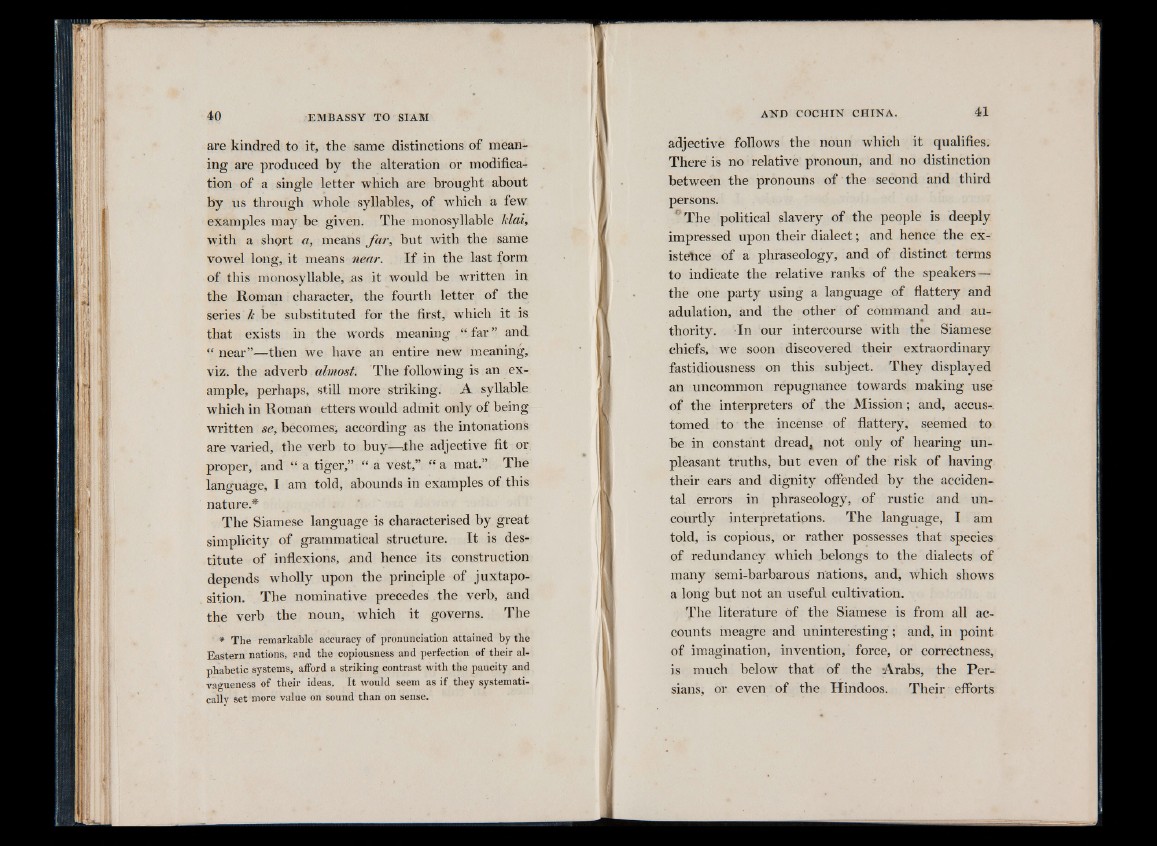
are kindred to it, the same distinctions of meaning
are produced by the alteration or modification
of a single letter which are brought about
by us through whole syllables, of which a few
examples may be given. The monosyllable klai,
with a short a, means fa r , but with the same
vowel long, it means near. I f in the last form
of this monosyllable, as it would be written in
the Roman character, the fourth letter of the
series k be substituted for the first, which it is
that exists in the words meaning “ far ” and.
“ near”—then we have an entire new meaning,
viz. the adverb almost. The following is an example,
perhaps, still more striking. A syllable
which in Roman etters would admit only of being
written se, becomes, according as the intonations
are varied, the verb to buy—-.the adjective fit or
proper, and “ a tiger,” “ a vest,” “ a mat.” The
language, I am told, abounds in examples of this
nature.*
The Siamese language is characterised by great
simplicity of grammatical structure. It is destitute
of inflexions, and hence its construction
depends wholly upon the principle of juxtaposition.
The nominative precedes the verb, and
the verb the noun, which it governs. The
* The remarkable accuracy of pronunciation attained by the
Eastern nations, and the copiousness and perfection of their alphabetic
systems, afford a striking contrast with the paucity and
vagueness of their ideas. It would seem as if they systematically
set more value on sound than on sense.
adjective follows the noun which it qualifies.
There is no relative pronoun, and no distinction
between the pronouns of the second and third
persons.
°Th e political slavery of the people is deeply
impressed upon their dialect ; and hence the existence
of a phraseology, and of distinct terms
to indicate the relative ranks of the speakers—
the one party using a language of flattery and
adulation, and the other of command and authority.
In our intercourse with the Siamese
chiefs, we soon discovered their extraordinary
fastidiousness on this subject. They displayed
an uncommon répugnance towards making use
of the interpreters of the Mission; and, accustomed
to the incense of flattery, seemed to
be in constant dread, not only of hearing unpleasant
truths, but even of the risk of having
their ears and dignity offended by the accidental
errors in phraseology, of rustic and un-
courtly interpretations. The language, I am
told, is copious, or rather possesses that species
of redundancy which belongs to the dialects of
many semi-barbarous nations, and, which shows
a long but not an useful cultivation.
The literature of the Siamese is from all accounts
meagre and uninteresting ; and, in point
of imagination, invention, force, or correctness,
is much below that of the Arabs, the Persians,
or. even of the Hindoos. Their efforts